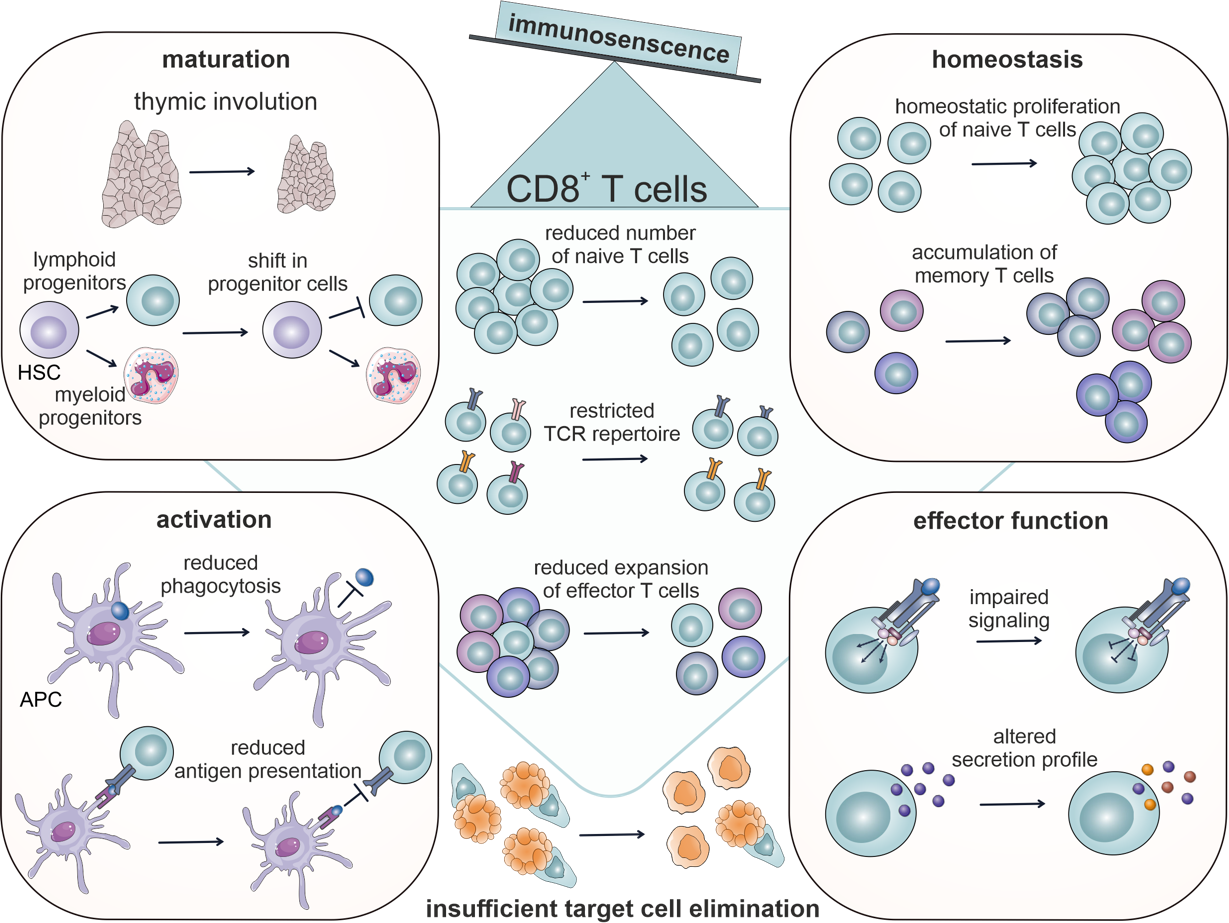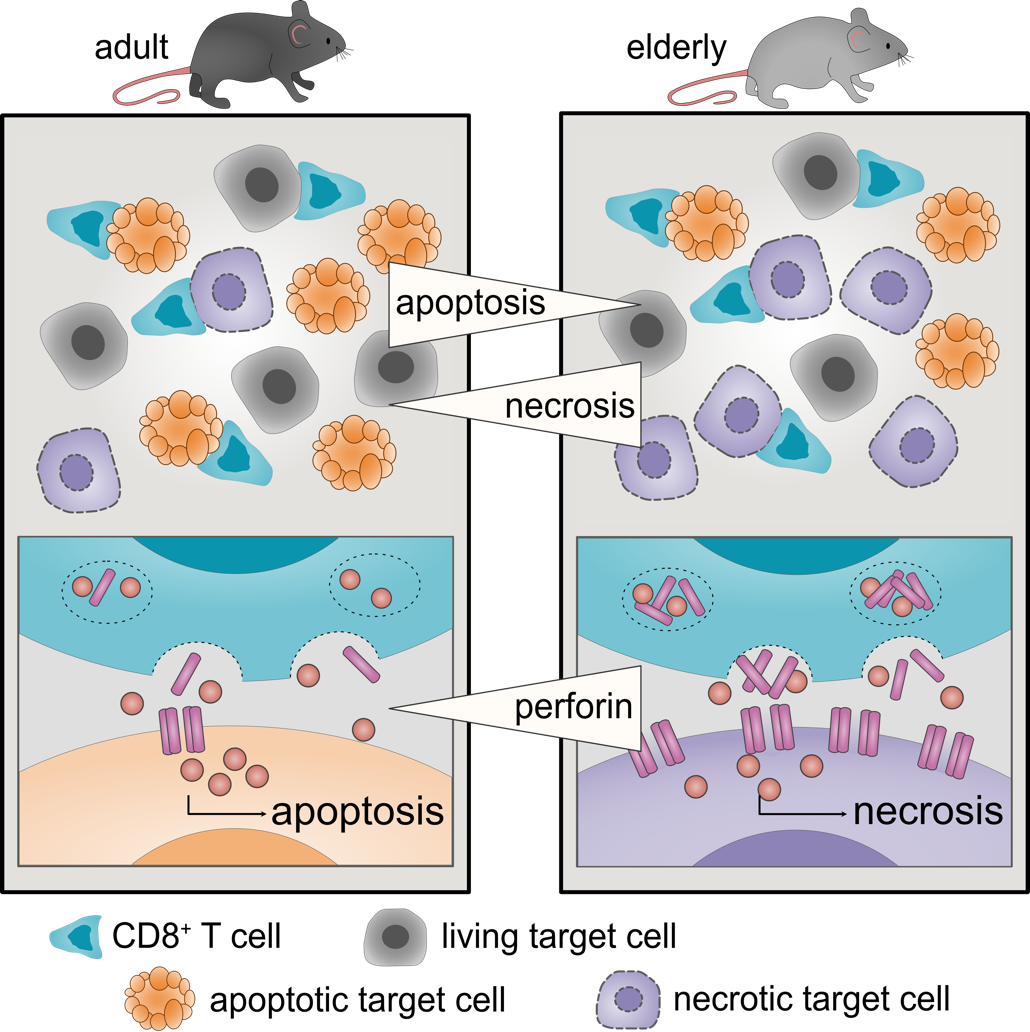Dr. A. Lis
|
Tel.: 06841 / 16-16318 Email: |
|
Postal address: Universität des Saarlandes D-66421 Homburg |
Ageing of the immune system
The increasing risk of cancer and the severe course of disease associated with infections demonstrate the dramatic impact of immune system impairment on the quality of life and mortality in the elderly. With the rapid increase in the aging population, the compromised immune system with progressive age will become an important public health issue of the 21st century. At cancer diagnosis, the majority of patients are older than 65 years. Yet this age group is often underrepresented in clinical trials of new immunotherapies due to comorbidities and immunosenescence in elderly patients. A better understanding of the underlying mechanism, and the development of new strategies to counteract it, are essential for prolonging healthy life by preventing infectious diseases/cancer and thereby improving the quality of life in later years.

The research focus of our group is to elucidate cell-intrinsic alterations in the initiation of effector functions of cytotoxic immune cells from humans and mice (CD8+ T cells, NK cells) and their impact on immune competence in aging. In addition to cytotoxic activity against different tumor cells, we are interested in the molecular signaling pathways that control the efficiency of Ca2+-dependent killing of cancer cells. Our previous projects provided some surprising insights into the cell-specific changes of CD8+ T cells in the aging process, which we characterize even further in more detail with a view to immunotherapeutic approaches:
Altered Ca2+ signaling in CD8+ T cells from elderly mice
Calcium signals are essential for regulating a broad spectrum of physiological processes. In cells of the immune system, calcium signals are necessary for diverse cellular functions including differentiation, proliferation, effector function, and gene transcription. The major route of calcium influx in human lymphocytes is through store-operated calcium entry (SOCE), mediated by calcium release-activated calcium channels (Icrac). In CD8+ T cells from elderly mice, we demonstrated a reduction in Ca2+ currents through Orai channels due to decreased expression of STIM and Orai proteins and more rapid extrusion of Ca2+ due to increased expression of PMCA4. These changes are associated with reduced CD8+ T cell cytotoxicity sensitivity to variations in external Ca2+ concentration.
Increased cytotoxicity of murine CD8+ T cells
Despite reduced Ca2+ signaling and overall reduced T cell immunity with age, the cellular cytotoxic efficiency of CD8+ T cells increases. Using fluorescence-based real-time cytotoxicity assays at the population and single cell level established in our laboratory, we demonstrated that at comparable numbers of cells, CTLs from aged mice exhibit increased cytotoxic activity with enhanced killing kinetics against various tumor cell lines. This heightened cytotoxic efficiency is not limited to specific T cell subtypes. It applies equally to the cytotoxic activity of central memory and effector memory T cells, indicating a broad and robust memory T cell response with age. In addition to in vitro polyclonal stimulation, these results could be confirmed using a newly established heterozygous OT-I aging mouse model. Kinetic analysis of antigen-directed target cell lysis confirmed the high cytotoxic efficiency of CD8+ T cells with age.This dynamic process underscores the potency of these cells in targeting and eliminating potential threats. Increased perforin and granzyme B expression in CD8+ T cells from elderly OT-I mice and C57BL6/J wild-type mice support our hypothesis that cell-intrinsic alterations in the expression of lytic effector molecules drive the augmented cytotoxicity. Furthermore, the high perforin levels in CD8+ T cells from elderly mice shift the mode of target cell death from granzyme-mediated apoptosis to rapid induction of necrosis caused by extensive membrane rupture.

The interplay between calcium and redox during aging
Oxidative stress plays an essential role in aging and in the regulation of immune responses. The progressive accumulation of ROS (reactive oxygen species) during the aging of an organism impairs cell and tissue function and shortens its lifespan. In addition, there is evidence that redox-dependent modifications of ORAI and STIM play a role in the regulation of SOCE (store-operated Ca2+ entry). The interplay between SOCE and ROS is multifaceted. ROS regulates the activity of various Ca2+ channels, including SOCE activity in immune cells. Orai1- and Orai3- channels show differential redox sensitivity to oxidation by H2O2. Besides STIM1 being sensitive to ROS, STIM2 is important for SOCE regulation in hypoxia. In cooperation with Hsin-Fang Chang (Cellular Neurophysiology) and Leticia Prates Roma (Biophysics), we are investigating the ability of ROS to regulate immune cell function and their cytotoxic activity against tumor cells.
Essentially, we are interested in the efficiency of the immune system in killing tumor cells in aging and their essential molecular signaling pathways. For these studies in the primary murine and human system, we have a whole range of methods and assays at our disposal, including:
- temporally very well resolved cytotoxicity assays in 96/384-well plates
- single cell assays with fully automated analysis (detection, contact information, tracking, and analysis of both killer and target cells)
- Quantification of apoptosis, necrosis, and mixed forms over time periods up to 24 hours (FRET-based pCasper-GR construct)
- Fluorescence-based calcium signaling imaging and analysis in primary immune cells
If you are interested in our research, we always seek passionate and dedicated students to join and support our dynamic team! Don't hesitate to get in touch with us!
